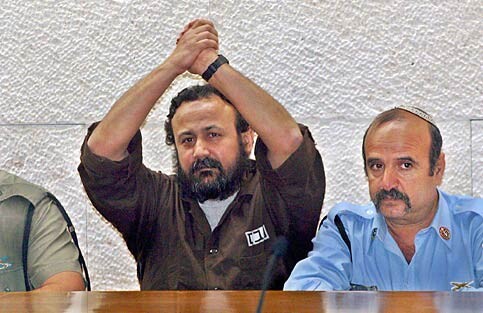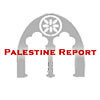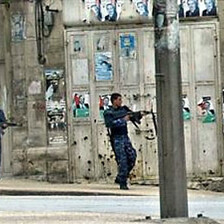Palestine Report 16 December 2004
This week Palestine Report Online interviews Fateh Member of the Legislative Council from Jerusalem Hatem Abdel Qader on Marwan Barghouti’s decision to withdraw from the Palestinian elections.

Marwan Barghouti in an Israeli court, 3 April 2003. (Photo: BAUBAU/SIPA)
PR: Marwan Barghouti has pulled himself out of the elections. How do you read that situation?
Abdel Qader: I feel good about his decision. I think we must keep the unity of Fateh at this stage and now we have just one Fateh candidate, Abu Mazen [Mahmoud Abbas]. I think everyone in Fateh supports that, and it is a good sign that Fateh can arrange its own affairs. I don’t think we have any problems regarding the elections.
PR: How do you think this affected Marwan’s standing in the popular mind? Do you think it had a negative affect?
Abdel Qader: I think Marwan had the full right to run, but I personally think he should run in Fateh itself before this. We have bodies in Fateh, the Central Committee, the Revolutionary Council and the Higher Committee, and I think Marwan should run in these bodies first.
I think Marwan wanted to make a point about democracy in Fateh, that it’s not only Abu Mazen, that the door should be open to more people to run in Fateh. I think he feels that inside Fateh we should hold a conference and at this conference people should nominate themselves, in a kind of primary, before we agree on one [candidate]. He was making the point that such a process did not happen, and he wanted to send the message that Fateh needs to reform after Arafat, because this is not a simple time. Only institutions, democracy and elections can replace Arafat.
PR: Do you think that this message was received? Do you think Fateh is serious about convening the General Conference, which has been delayed for many years, and to sort these gripes out that the younger generation seems to have?
Abdel Qader: Yes, I think the message was received. I think our challenge as the new generation, is not this election. Our challenge is in the next general conference of Fateh. We hope that we can make a change in this conference in two ways. The first way is to empower the younger generation, and secondly we must build a democratic system within the movement and to create a new style, new vision, new thinking, and a new plan. This is our challenge. We sent many messages to Marwan that this stage, this election, is not the time for the new generation. The real role for us is in this conference.
PR: Externally, how do you see Fateh at the moment? At Nablus’ Al Najah University Fateh recently won the student elections for the first time in a long time. Do you feel Fateh is getting stronger?
Abdel Qader: Yes. I think Fateh is stronger now than in a long time. Arafat’s death put us all under pressure to unite. And I think this is what happened. I am encouraged that when Fateh decided to succeed, Fateh succeeded. But we still have a lot of work to do. Nevertheless, Fateh remains the main power in the political system.
PR: Now that Marwan is out, and Hamas long ago declared they would not contend the presidential elections, Abu Mazen appears to be a certain winner. How much legitimacy will he have as long as serious contenders or Hamas are not contesting the elections?
Abdel Qader: This is a problem for Hamas, it’s not Abu Mazen’s problem. Nor is it a problem of legitimacy. The door is open to all the Palestinian parties, and if they decide not to participate, it is not our problem, it is not a problem of democracy, nor is it a problem of legitimacy, it’s a problem of Hamas. People will vote, and Hamas must respect the decision of our people. They are free to run, and we hope they will run in the PLC elections.
PR: How important is that?
Abdel Qader: I think it is very important for us to encourage Hamas to join the political process. Now we are in a new stage and we must think of the interests of our people. We are in a tough situation and Hamas must change its agenda. Hamas must get involved in our institutions, whether in the PLC, the PA, or the PLO. We are now discussing a new election law, and this opens the door for Hamas and all other parties to run in the elections. We hope that they will run in the PLC elections.
PR: What’s the situation in Jerusalem? Are the Israelis going to allow Jerusalemites to vote?
Abdel Qader: Yes. There will be no election without Jerusalem. And it is not the first time we hold elections in Jerusalem. We now have a joint Israeli-Palestinian committee to organize technical details on how to hold these elections. We have been talking for two weeks. I also held a meeting with Elliot Abrams, the US special envoy, at the American Consulate in West Jerusalem, and he said the US agreed that Jerusalem should be a part of elections, and he promised that Washington would help ensure there would be elections in East Jerusalem like in 1996.
PR: And do you feel they are applying pressure and that the Israelis are responding?
Abdel Qader: Yes. There is more pressure now on Israel to not stand in the way of these elections as well as to take off closures and checkpoints in the West Bank and Gaza Strip and to allow East Jerusalemites to participate.

Related links:


